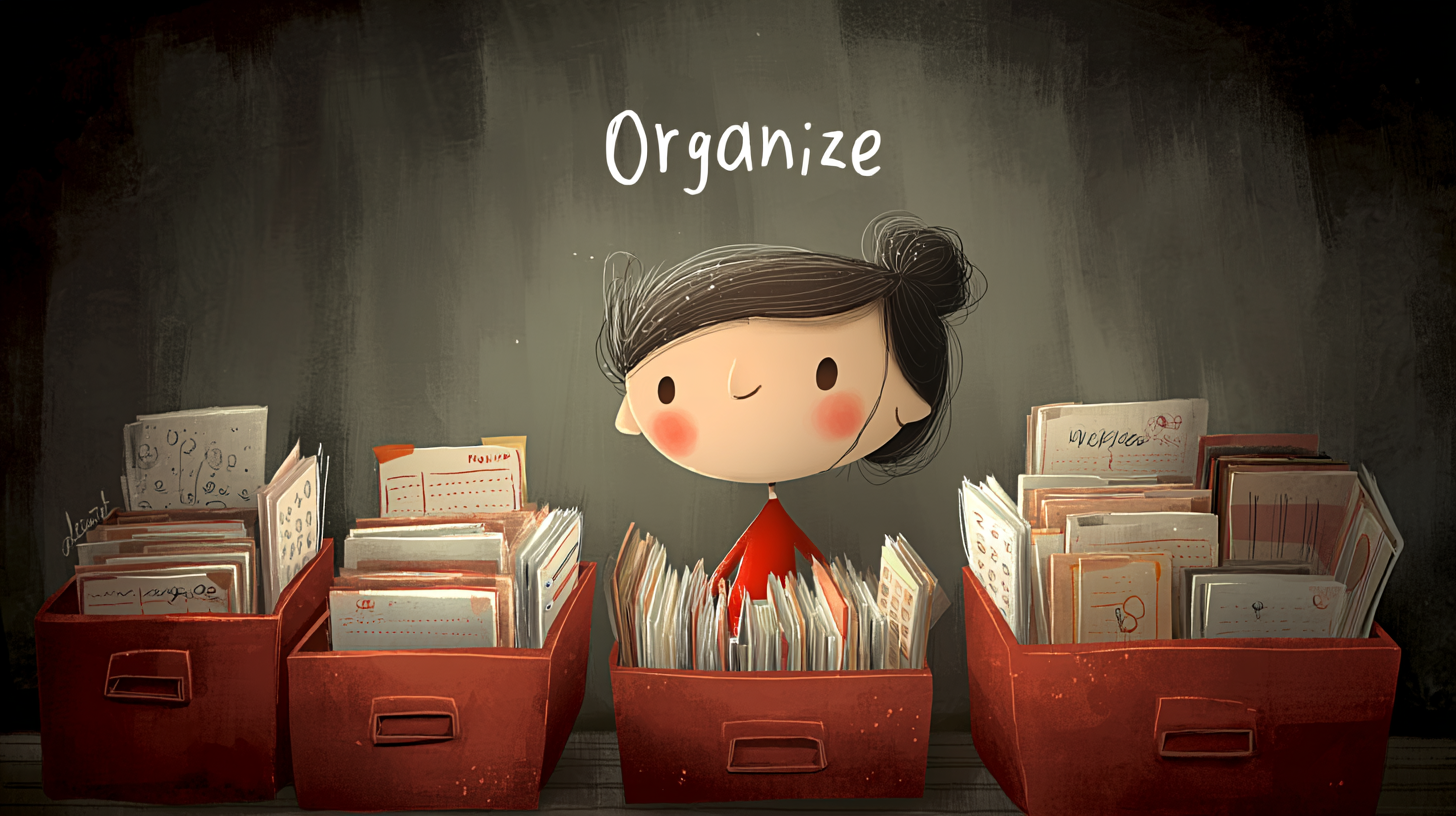“Organize” means to put things in order or plan something carefully.
「organize」は、物事をきちんと並べたり、イベントを計画したりすること。
以下は英単語 “organize” に関するストーリー型学習コンテンツです。まずは大枠の意味を理解して最後の文章で確認しましょう。
主な意味(main meaning)
| 品詞 | 意味(英語) | 発音記号 | 英語例文 |
|---|---|---|---|
| 動詞 (verb) | to arrange things in a structured way | /ˈɔːrɡənaɪz/ | She organized the books on the shelf by color. |
| 動詞 (verb) | to plan and prepare an event or activity | /ˈɔːrɡənaɪz/ | They organized a birthday party for their friend. |
語源(etymology)
語源はラテン語の organizare(道具や部分を組み立てる)に由来し、ギリシャ語の organon(道具)から来ています。「部分をまとめて、全体を整える」というイメージです。
類義語(synonyms)
| 類義語 | 例文 |
|---|---|
| arrange | She arranged the chairs in a circle. |
| sort | He sorted the files by date. |
| plan | We need to plan our trip ahead of time. |
| structure | The teacher structured the lesson clearly. |
| coordinate | She coordinated the volunteers for the event. |
反義語(antonyms)
| 反義語 | 例文 |
|---|---|
| mess up | He messed up the desk again. |
| disorganize | The papers were disorganized and hard to find. |
コロケーション(collocations)
| コロケーション | 例文 |
|---|---|
| organize a meeting | They organized a meeting with the team. |
| organize your time | It’s important to organize your time well. |
| organize an event | She helped organize an event for charity. |
| organize files | He spent the afternoon organizing files. |
| organize a group | They organized a group to clean the park. |
2項表現(binomials)
| 表現 | 例文 |
|---|---|
| order and organize | You need to order and organize your notes before the test. |
| plan and organize | She learned to plan and organize her day better. |
英語ストーリー(english story)
タイトル:The Office Makeover
Karen worked in a small office. One day, her manager asked her to organize the entire file room. It was a mess. “If you can sort and arrange these files,” he said, “we can work more efficiently.”
Karen started by labeling all the folders. She organized them by date and topic. She also decided to plan and organize a new meeting schedule for the team. Everyone was impressed. “You really know how to coordinate a project!” said her coworker, Tim.
Later that month, they had to organize an event for new clients. Karen took charge again. She made sure everything was in order. Unlike before, there was no chaos or disorganization. Tim laughed and said, “You’ve turned this office from a mess into a model!”
和訳
タイトル:オフィスの変身
カレンは小さなオフィスで働いていました。ある日、上司がファイル室全体を**organize(整理する)ように頼みました。そこはひどい状態でした。「もしこれらのファイルをsort(分類)してarrange(並べ)**てくれたら、もっと効率よく働けるよ」と彼は言いました。
カレンはまずすべてのフォルダーにラベルを付け、日付やトピックで**organize(整理)しました。そして、チームの新しい会議スケジュールもplan and organize(計画して整理)しました。みんな感心して、「本当にプロジェクトをcoordinate(調整)**するのが上手だね!」と同僚のティムが言いました。
その月の後半、新しいクライアント向けのイベントを**organize(計画)する必要がありました。カレンが再び担当しました。すべてが順調に準備されました。以前のようなdisorganization(混乱)はもうありませんでした。ティムは笑って言いました。「このオフィスをmess(散らかり)**から模範に変えたね!」
Q&A
Q: 「organize」と「arrange」はどう違いますか?
A: 「arrange」は物の配置を整えることに重点があります。例えば「イスを丸く並べる」といった場面です。一方「organize」は配置に加えて、計画・管理・全体の構造を整えるニュアンスが強く、より広い意味で使われます。
Q: 「organize」と「sort」の違いは?
A: 「sort」は物を種類や順序に分けて分類することを指します(例:日付順に書類を並べる)。一方で「organize」は分類だけでなく、それをどう活用するか、どこに置くかなど、全体を整える行為まで含みます。
Q: 「organize」と「plan」はどう違うの?
A: 「plan」は何かを始める前に「こうしよう」と考える段階を指します。たとえば旅行のスケジュールを立てることが「plan」です。「organize」はその計画を実際に準備して実行できる形に整える段階まで含まれます。
Q: 「organize」と「structure」はどう使い分けますか?
A: 「structure」は情報や文章、組織などに「構造」を作ることを意味します。論理的に並べることに重点があります。「organize」は構造づくりだけでなく、それを動かすための準備や管理も含みます。
Q: 「organize」と「coordinate」は何が違う?
A: 「coordinate」は複数の人やチーム、活動がうまく連携して働くように調整することです。たとえばイベントでスタッフや時間を合わせる場面で使われます。「organize」はそれに加えて、必要なものを準備し、全体を整える意味も持ちます。
Q: 「organize a meeting」と「plan a meeting」はどう違うの?
A: 「plan a meeting」は「いつ、どこで、誰と」という予定を考えることが中心です。「organize a meeting」はその会議に必要な資料を用意したり、場所を予約したり、実際に行えるように準備することを含みます。
Q: 「organize your time」とはどういう意味?「plan your time」との違いは?
A: 「organize your time」は自分の一日の時間の使い方を管理することで、優先順位をつけたり、無駄を減らしたりします。「plan your time」は何時に何をするか予定を立てる意味合いが強いですが、「organize」はそれをより現実的で効率的に実行する準備をする感じです。



コメント